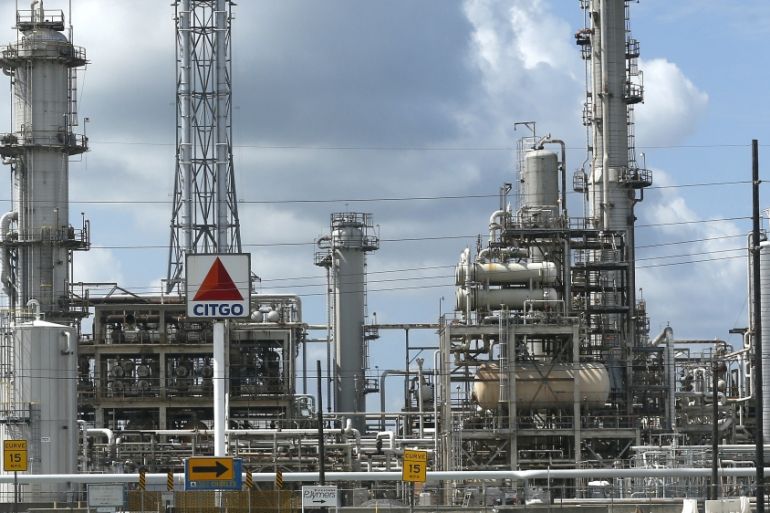Venezuela opposition moves to seize control of oil revenue
Opposition-controlled Congress named new temporary board of directors for state-owned oil firm PDVSA.

Venezuela’s opposition-controlled Congress named a new transitional board of directors for state-owned oil firm PDVSA on Wednesday in an effort to wrest the OPEC nation’s oil revenue from President Nicolas Maduro.
An increasingly isolated Maduro lashed out at Congress leader Juan Guaido, saying in an interview that he would face the courts “sooner or later” for violating the constitution after he declared himself interim president last month.
Keep reading
list of 4 itemsChina’s economy beats expectations, growing 5.3 percent in first quarter
Inside the pressures facing Quebec’s billion-dollar maple syrup industry
Manipur’s BJP CM inflamed conflict: Assam Rifles report on India violence
Although many Western countries have recognised Guaido as the legitimate head of state, Maduro retains control of state institutions and Guaido needs funds if he is to assemble an interim government.
Controlling PDVSA‘s US refiner Citgo Petroleum, Venezuela’s most valuable foreign asset, would go some way to helping in that, although seizing the reigns of PDVSA itself seems improbable while Maduro remains in power.
“We have taken a step forward with the reconstruction of PDVSA,” Guaido said on Twitter, just after Congress named the directors. “With this decision, we are not only protecting our assets, we also avoid continued destruction.”
“The new directive will be made up of capable Venezuelans, free of corruption and without partisan affiliation. In addition, we will have the first woman to hold a position of this nature in our oil industry,” he added.
La nueva Directiva estará conformada por venezolanos capaces, libres de corrupción y sin afiliación partidista. Además, tendremos la primera mujer en ocupar un cargo de esta naturaleza en nuestra industria petrolera.
¡Avanzamos en el rescate de Venezuela! #CITGOParaLosVenezolanos pic.twitter.com/hq7HpwJGqz— Juan Guaidó (@jguaido) February 13, 2019
PDVSA‘s crude output has slumped to 70-year lows due to crushing debts, widespread corruption, and poor maintenance of its infrastructure. The administration of US President Donald Trump, which backs Guaido, imposed sanctions on Venezuela’s oil sector on January 28, seeking to curb exports to the United States and up the pressure on Maduro.
The proposed Citgo board would comprise Venezuelans Luisa Palacios, Angel Olmeta, Luis Urdaneta and Edgar Rincon, all of whom are currently living in the US, plus one American director.
The nominations fuel a growing duel for control between Guaido and Maduro, who has promised he will not allow Citgo to be “stolen”. The mechanics of how the new board would take over are unclear, and there are likely to be court challenges to the board’s authority, people familiar with the deliberations say.
Citgo and PDVSA did not immediately reply to requests for comment.
Guaido invoked a constitutional provision three weeks ago to assume Venezuela’s presidency, arguing that Maduro’s re-election last year was a sham.
Maduro, in an interview released on Wednesday by Lebanese television channel al-Mayadeen TV, said Guaido was seeking to divide the country and convince the Trump administration to launch a foreign intervention.
“This person, who believes that politics is a game and he can violate the constitution and the law, sooner or later will have to answer before the courts,” Maduro said, adding he was “absolutely sure” of this.
“If the American empire dares to touch even one palm leaf in our territory, this will turn into a new Vietnam,” he said.
US military intervention?
A senior US politician said on Wednesday that Congress would not back a US military intervention in Venezuela.
The Trump administration has said it wants a peaceful resolution to the crisis but Trump has repeatedly refused to rule out military action.
“I think there are a number of solutions, a number of different options, and we look at all options,” Trump said when asked about the issue on Wednesday, in an appearance at the White House with Colombian President Ivan Duque.
Separately, Elliott Abrams, the State Department point man for Venezuela, said on Wednesday that military intervention “is not a path that the US government is pursuing”.
“I don’t see a reason” for the use of force, he added during a House Foreign Affairs Committee hearing.
Abrams has come under fire from Democrats over his past embrace of American covert action in Latin America.
Meanwhile, the US and other countries are trying to channel aid to Venezuela.
Guaido told a huge rally of supporters on Tuesday that humanitarian aid would enter the country on February 23, setting the stage for a showdown with Maduro, who has refused to let supplies in.
Maduro denies there is an economic crisis despite a widespread lack of food and medicine, and hyperinflation that has economically crippled millions of Venezuelans.